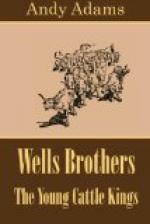Four days were required to graze the heavy cattle down to the railroad. Dell drove the wagon, Sargent was intrusted with the remuda, the two others grazing the beeves, while each took his turn in standing guard at night. Water was plentiful, cars were in waiting, and on reaching the railroad, the cattle were corralled in the shipping pens.
Joel and Manly accompanied the shipment to Kansas City. The beeves were consigned to the firm mentioned in the bill of sale as factor in marketing and settlement of the herd which had recently passed from the possession of Mr. Stoddard to that of Wells Brothers. The two cars of cattle found a ready sale, the weights revealing a surprise, attracting the attention of packers and salesmen to the quality of beef from the Beaver valley.
“Give me the cattle from the short-grass country,” said a salesman to a packer, as Wells Brothers’ beeves were crossing the weighing scale. “You and I needn’t worry about the question of range—the buffalo knew. Catch the weights of these cattle and compare it with range beef from the sedge-grass and mountain country. Tallow tells its own story—the buffalo knew the best range.”
An acquaintance with the commission house was established on a mutual basis. The senior member of the firm, a practical old man, detained Joel and Manly in his private office for an hour.
“This market is alert to every new section having cattle to ship,” said the old man to Joel, studying a sales statement. “The Solomon River country sent in some cattle last fall, but yours is the first shipment from the Beaver. Our salesman reports your consignment the fattest range beeves on to-day’s market. And these weights confirm the statement. I don’t understand it. What kind of a country have you out there?”
Joel gave Manly an appealing look. “It’s the plains,” answered the latter. “It’s an old buffalo range. You can see their skulls by the thousand. It’s a big country; it just swells, and dips, and rolls away.”
It was the basis of a range which interested the senior member. “The grasses, the grasses?” he repeated. “What are your native grasses?”
“Oh, just plain, every-day buffalo grass,” answered Manly. “Of course, here and there, in the bends of the Beaver, there’s a little blue-stem, enough for winter forage for the saddle stock. The cattle won’t touch it.”




